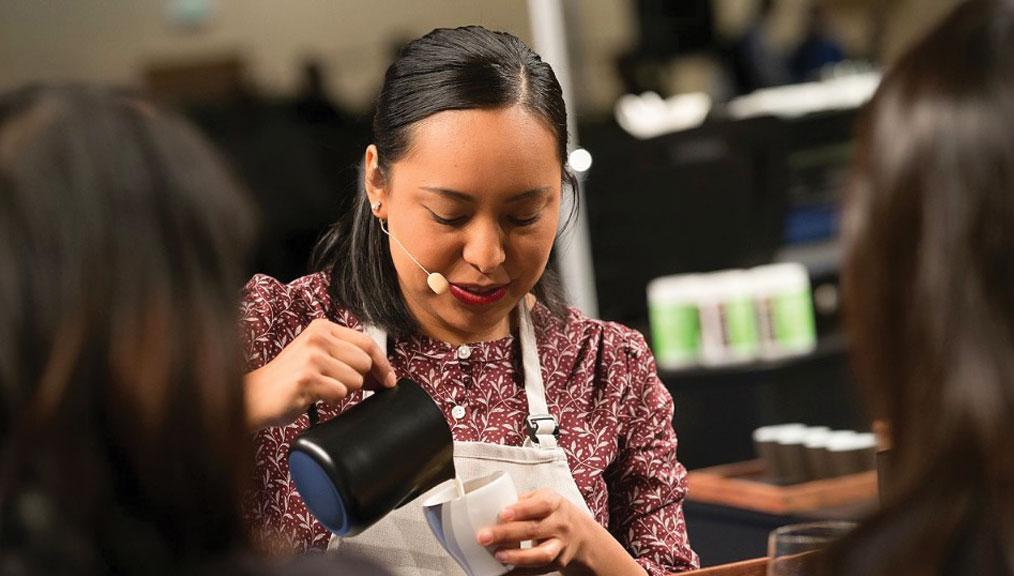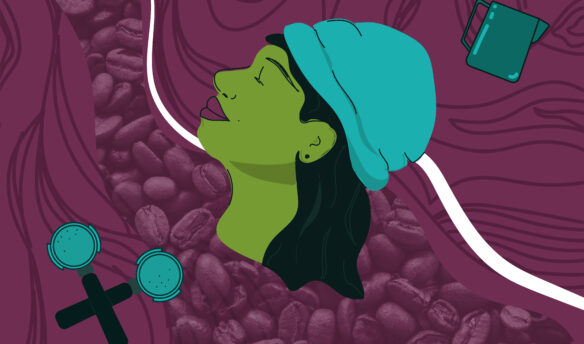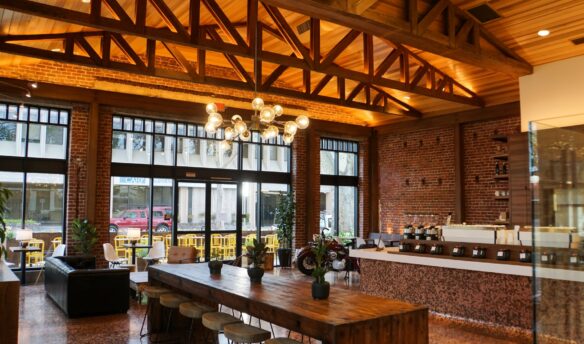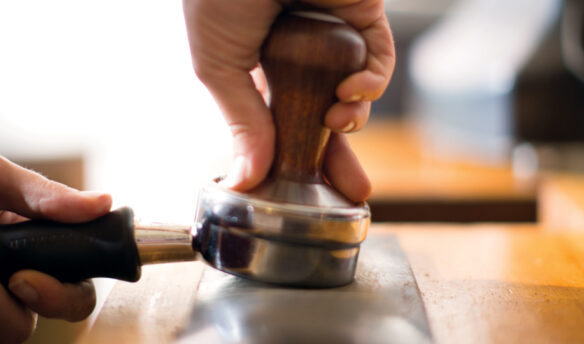[W]hen Julieta Vázquez Rivera attended her first coffee conference, it was her first experience with coffee. Period. Having grown up in a family that ran bakeries, Vázquez was accustomed to being around the hospitality business, but had never seen the capabilities of coffee. The opportunity to open a coffee branch in her family’s business changed everything—especially when Vázquez saw competitive baristas in action.
Vázquez was Mexico’s barista champion in 2014 and 2015, and served as a judge for this year’s national competition. She and her fiancé, Manuel Vázquez, now run Arandela Barra de Café in San Luis Potosí, the capital city of Mexico’s north-central state by the same name.
This interview has been edited for clarity and space.
You got into coffee through your family’s business. Tell me more about that.
My family has bakeries, so I grew up tasting and smelling bread. My mom was looking to grow her business, so she decided to open a coffee shop inside her bakery. I was studying marketing when she invited me to come and help her. I accepted and then I went to Expo Café where the Mexican barista competitions are. That was my first contact with coffee—not specialty coffee—coffee. Then I started to learn about chains, about training baristas. We bought our first espresso machine and a barista gave us our first training. When I met him, he was a barista competitor, so that inspired me because I’d seen Aleli Moreno in my first visit to Expo Café—she was the first woman to win Mexico’s national barista competition. When I saw her, I didn’t have any idea what she was doing. But she was passionate. I saw her very, very happy and that’s the moment when I told my fiancé, ‘I don’t know what she’s doing, but I want to do that.’ That’s where my bug for coffee started to grow. I started training for my first regional competition.
So you went from knowing nothing about coffee to competing in a matter of months?
We had about three months of experience. The coffee shop wasn’t open yet, we had only been training and learning. When I got to Guadalajara, I was scared. A lot of people had roasted their own coffee, so I was scared that I’d be disqualified since I hadn’t roasted my own coffee. But I did my best. I was very nervous. I took sixth place, then seventh at nationals. In 2013 I was second at nationals. That was my first time in finals with a very good place. Next year was 2014 and I took first place, and then I went to Seattle for the WBC where I met amazing people. I definitely saw a change in myself as a barista before and after Seattle. And then I won nationals again in 2015, so there were two years for a girl to be champion in Mexico. I am very lucky because I got a lot of support from other baristas and from the coffee community in Mexico. I learned and I grew as a coffee professional. Today I feel a responsibility to now give back to the coffee community, making myself available to share everything I received from the community.
When you say you noticed a changed in yourself as a barista, what were some of the things you noticed?
Confidence. I’m very shy. And I started to believe in myself, which is a difficult thing to accept, just being a human being. I started to trust myself more and make decisions, not only in my business, but in my social life, too. As a professional, I have more questions. That’s why I decided to compete again. I figured out that you never know enough about coffee. Not only preparing to brew it or roast it, but the farm, the process—everything. That’s what keeps me here.
And you didn’t compete this year, you judged? What was that experience like for you?
The Mexican Coffee Association (AMECE) invited me. I felt it was the next step in my professional coffee life. So I was in workshop for a few days before competition and I think that my experience as a competitor helped me to be on the other side. I understood the rules in a different way. But I was a little bit more nervous because I didn’t want to affect anyone in a bad way, or give benefit to a competitor without it being deserved. If I made a mistake as a competitor, it was my own responsibility and it goes in my numbers. But if I write 2.5 when a competitor deserves 3, that could be a change between second and third place.
Two years ago, you separated your business from the bakery, changed the name, and established a new café.
It used to have the bakery’s name. A lot of people in Mexico still think my coffee has the name of the bakery: Café Julie. It started when I was born. I was born in January and my parents opened the bakery in March.
So when you changed over to the new cafe, you changed names, changed locations—it was your opportunity to start a new business.
And establish myself independently of my family.
What were some of the things that you did to distinguish it from the bakery cafe?
My hometown is not a very touristic place. I wish it was—it’s a really beautiful place. I moved the café to a place where people ask for more. They’re picky. But the place I moved, my new market was people who travel a lot, people who have a little bit more money to spend on a cup of coffee. I tried to put my best as a team because it was not only me, it was also Manuel —we are also partners in business and share our responsibilities—it was a big task as a team. But I think that we’ve been doing a really good job. Our menu is very complete. We have a cold-brew, which is new in San Luis Potosí, nobody has it in the whole state. It also has a brew bar with an Aeropress and Chemex and Clever Dripper. No coffee-and-milk variation goes out without good latte art. It has to be pretty. And we also have milkshakes, we have hot chocolate, we have lemonades. Our goal is to improve the local coffee consumption and to share. Sharing the story behind the bean can sound silly or romanticized, but it’s true. The customer becomes a judge. They start to identify their own likes and preferences, which is my big prize. I have someone who is going to keep asking for more, and that’s a challenge.

What have people’s responses been to a new coffee scene in San Luis Potosí?
A lot of different responses. From the positive, asking when we’ll have a new coffee, or saying we roasted a coffee differently, or that yesterday the espresso was better. Which says that people have been listening. But there’s also the less good news that some customers really don’t care and they just want coffee.
You have lots of exciting things coming up, like getting married and continuing to grow your business. What other goals do you have for your café or your coffee journey? Do you have thoughts of things you might like to explore in coffee?
I just want to make my coffee shop a good place for people. I’m a person who thinks and truly believes in family, so I want to create a place where a couple or friends or family can go to have a good cup of coffee, and to be able to share the story behind the cup. But also, as any business, I want to grow. I’m thinking about opening new shops. I’m not really looking for franchises, I think you lose connection with people.
The coffee that you serve in your café, is it all from Mexico?
It’s always Mexican coffee, but we are always changing. I mean, today my business is small so I can change as many times as I want. We don’t want to change habits or likes, we just want them to try something new and then they can decide. We just want to give our customers a chance to try something else.
Were you able to apply any lessons from WBC to running your café or training staff?
We changed the training a little bit for new people. They were all inspired by my winning the Mexican competition, so I believe one day they can win as well if they want to. We changed the training a little bit for two things: one is to have better results. And the second is to make it more fun. And learn more. We have small competitions between us. So sometimes I’m a competitor and sometimes I’m a judge. We do blind tastings to make it fair. A lot of times I lose and that’s so exciting because another barista has all the confidence to express himself or herself about the cup. It’s a challenge for me because part of me, aside from being the leader, part of me wants to win. So we do fun things like the espresso at the bottom is buying the tacos tonight or paying for beer. We’re a small team of six or so and we’ve become a family.
—Ellie Bradley is Fresh Cup‘s editor.
















